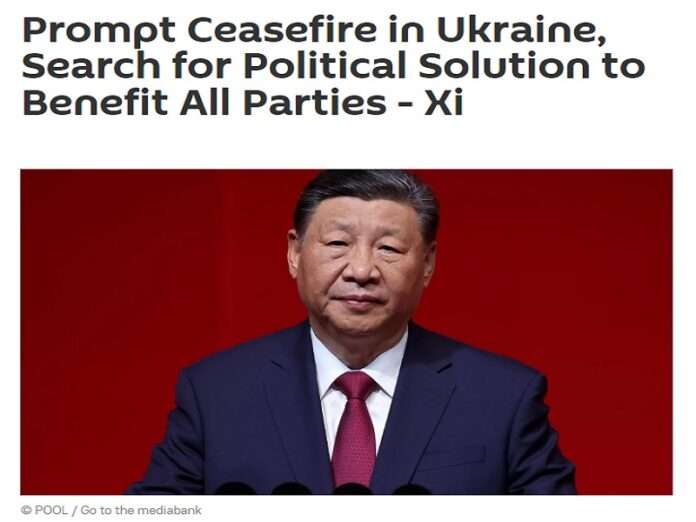Chinese President Xi Jinping reiterated his call for a prompt ceasefire during surprise talks with Hungarian Prime Minister Viktor Orban in Beijing on Monday, declaring that “A prompt ceasefire and hostilities [in Ukraine], as well as the search for a political solution, meets the interests of all parties.” The two leaders also confirmed that their positions towards this conflict coincide and asked the rest of the international community to do whatever they can to restore a direct Russian-Ukrainian dialogue.
For as noble it may be, Russia is unlikely to heed this latest call since Putin already told Orban during their meeting on Friday that he’s not optimistic about implementing a ceasefire before the resumptions of talks with Ukraine since he suspects that Kiev would exploit it to rearm. Furthermore, the Russian leader already shared his own ceasefire proposal in mid-June, which demanded that Ukraine withdraw from the entirety of Russia’s new regions as a precondition for peace.
Agreeing to a prompt ceasefire that leaves Russian-claimed territory under Ukrainian control could lead to accusations that Putin is contradicting the constitution after one of the amendments from 2020’s referendum prohibited ceding any of the country’s territory. Nevertheless, a legal loophole could be that nothing is being formally ceded even if the state of affairs remains in place indefinitely, plus the Ukrainian-controlled areas never voted in September 2022’s referendum to unite with Russia.
If the political will is present, then Putin could agree to a prompt ceasefire without any legal difficulties, but the problem of Ukraine exploiting this to rearm wouldn’t go away. He’d also risk looking weak after demanding less than a month ago that Ukraine would have to withdraw from the entirety of Russia’s new regions in order to resume talks. In addition, the conflict’s military-strategic dynamics favor Russia, and it could lose the momentum that it worked so hard to gain by silencing the guns all of a sudden.
Putin candidly admitted last December that he’s no longer naive so it’s very unlikely that he’d carry out yet another “goodwill gesture” after having been led by the nose so many times before in this respect. That’s precisely why he told journalists on the sidelines of last week’s SCO Summit in Astana that “We must ensure that the opposing side agrees to take steps that would be irreversible and acceptable to the Russian Federation” in order to ensure that they won’t take advantage of any cessation of hostilities.
To wit, he was referring to his earlier demand that it withdraws from the entirety of Russia’s new regions, but Ukraine could theoretically do something else such as pulling heavy weapons away from Russia’s pre-2014 borders in order to create Putin’s envisaged “security zone” for protecting Belgorod Region. If this is coupled with the curtailment of Western arms to Ukraine, which is unrealistic to expect so long as the Democrats remain in the White House, then he might be open to a ceasefire and resuming talks.
To be clear, nothing is being implied about Putin “selling out” or whatever. This piece is a thought exercise designed to explore how far Russia could go towards compromising with Ukraine and under what conditions. Without some irreversible moves first being made on Kiev’s part, it’s unlikely that Putin will agree to China’s latest call for a prompt ceasefire, so Xi and Orban should now concentrate their joint efforts on convincing Zelensky to carry out his own “goodwill gesture” in order to help bring this about.







